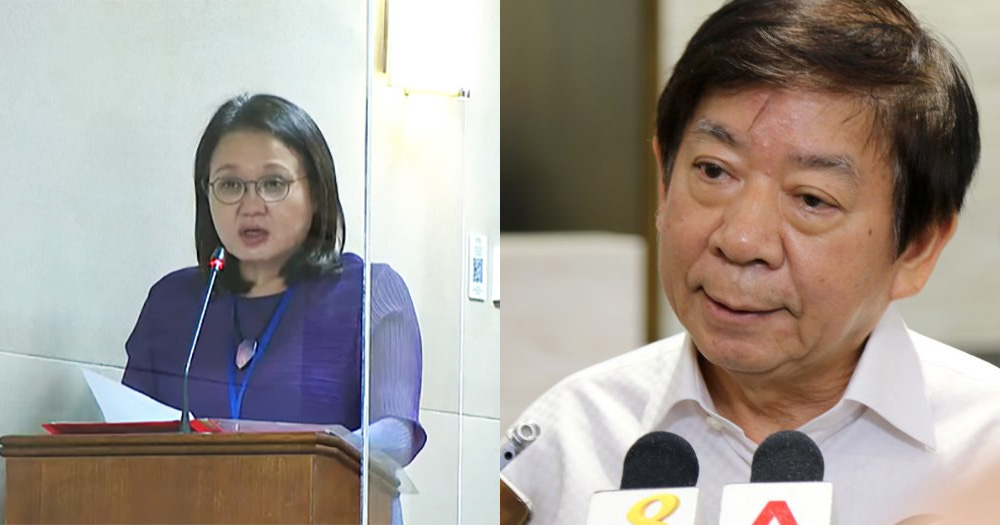Former Transport Minister Khaw Boon Wan has agreed to become the new chairman of the board of Singapore Press Holdings' (SPH) non-profit media entity.
The move was announced by Communications and Information Minister S Iswaran in a ministerial statement in Parliament on May 10.
Was it the government's suggestion that Khaw take on the role?
In response to the statement, Workers' Party (WP) chairman Sylvia Lim asked if other candidates had been considered, and whether the restructuring was a missed opportunity in choosing candidates who are "not so closely linked" to the government.
Here, Lim pointed out that Iswaran had acknowledged the concerns surrounding the implications of government funding on the editorial direction of The Straits Times.
However, Iswaran had also announced in the same statement that Khaw would be made Chairman of the SPH Company Limited by Guarantee (CLG) entity.
Lim also asked if Khaw was appointed after the government suggested him and the management shareholders agreed.
Lim highlighted, "I'm not questioning the personal integrity of Mr. Khaw. But the fact is that he is the former chairman of the People's Action Party and former Coordinating Minister for Infrastructure."
Iswaran: SPH has had past chairmen who have either been former civil servants or ministers
In response, Iswaran said, "I think the nub of her question really is, with Mr Khaw Boon Wan being asked by the management shareholders to chair the CLG, whether this creates problems from the point of view of editorial independence. I presume that's your main point."
He started by pointing out that the current chairman of SPH, Lee Boon Yang, was a former Cabinet Minister.
This has included portfolios such as the Minister for Information, Communications and the Arts, prior to his retirement in March 2009, as well as Minister for Defence, Minister in the Prime Minister’s Office and Minister for Manpower.
In addition, Lee is not the only chairman of SPH who was previously a senior civil servant or Cabinet Minister, Iswaran added.
In addition, the current chairman of Mediacorp is a former civil servant, Iswaran noted.
Niam Chiang Meng previously served as Permanent Secretary of Information, Communications and the Arts, and Permanent Secretary (National Population and Talent Division) in the Prime Minister's Office.
Iswaran said,"And yet, we are where we are today...in terms of the credibility of our media, the trust that Singaporeans have in our media, through this array of leadership."
As such, what matters is not a "perceived political hue in the appointments", Iswaran emphasised, but rather, the character, and capability of the person involved, he said.
Iswaran: Khaw has a "proven" track record of taking on difficult issues
With regard to Khaw himself, Iswaran added that he was held in high standing regionally, and had a "proven" track record of taking on difficult issues and handling them.
Calling the issue of SPH a major undertaking of national importance, Iswaran added that it required:
"Someone at the leadership level who has the gravitas, has the strategic vision, and the experience in undertaking these sorts of major tasks."
Khaw was therefore a choice both the government and the management shareholders were very keen on, he said, and there wasn't a "long shortlist" for the role, nor was a global search needed.
Turning to address Lim's point of a missed opportunity, he said:
"I think what would be a missed opportunity is if we allow political considerations to prevent us from making the right decision, in terms of the right person for the job to get it done."
Iswaran then clarified a good news media outlet to be as such:
"I don't think the definition of a good news media or a credible news media is that it must always not see eye to eye, but it has the occasion when it's necessary to be able to do so."
Leon: Will government allow more players into the media market via a "light touch" in licensing?
Subsequently, the WP's Media Team Head, Leon Perera, asked if the government would allow more players into the media market by employing a "light touch" in awarding licenses under the Newspaper and Printing Presses Act (NPPA).
Such licenses could be awarded to companies which are confident in overcoming the financial hurdles within the industry, such as The Guardian in the UK for instance, he added.
Perera also queried if Iswaran would consider creating a structure within the CLG, to ensure that senior editorial appointments are seen to be independent and safeguarded from all forms of influence.
During his question, Perera took out a copy of "OB Markers" by former ST editor-in-chief Yip Seng Cheong, recounting his experience where he claimed that the government has veto powers over who gets to edit the newspapers.
Iswaran: Technological trends made media finances more challenging
Iswaran answered that it was currently technological trends, instead of NPPA restrictions, which had made the financial model of media firms more challenging.
With regard to new entries in the media industry, Iswaran added that the landscape was "fairly vibrant" with newer players such as Rice Media and Mothership.
He also likened the landscape to an ecosystem with the presence of both traditional media such as Mediacorp and SPH, as well as international media.
Iswaran further said, "It's trying to ensure the overall local media grows and is able to hold its own vis-a-vis some of the broader competition it faces and the challenges we've talked about."
On the independence of senior editorial appointments, Iswaran replied that the government did not exercise a veto on such appointments and that the decisions were made by management shareholders.
Left screenshot via CNA, right photo by Joshua Lee
If you like what you read, follow us on Facebook, Instagram, Twitter and Telegram to get the latest updates.
